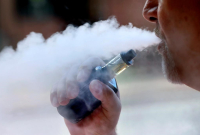Support strong Canadian climate journalism for 2025
The Alberta government will consider adding rules for vaping when it reviews the province's smoking and tobacco legislation next month.
Health Minister Tyler Shandro said he's particularly concerned about the growing number of youth who vape, but there's evidence it can be helpful for adults who are trying to quit smoking conventional cigarettes.
"I respect the rights of adults to choose for themselves, including choices that are unhealthy, but I don't want my kids or anyone else's kids to be pressured to start smoking or to start vaping," he told reporters Wednesday.
He added a quarter of Alberta teens report having vaped in the last month.
Some acute lung illnesses have been reported as a result of vaping in Canada, but to date no cases in Alberta have come up.
The Centres for Disease Control in the United States has said 80 per cent of the 800 recently reported severe lung illnesses from vaping involved people inhaling the cannabis compound THC with their device.
The review of Alberta's Tobacco Act — which was already set to take place this fall regardless of recent vaping headlines — will be led by legislature member Jeremy Nixon. It is to seek feedback from school districts, municipalities, retailers and health advocates.
Nixon said the review could look at a minimum age for vaping, limiting its use in public places and workplaces, and strengthening restrictions for advertising, especially to youth.
The work is to begin Nov. 1 and be completed by year's end, with a goal of having any changes brought before the legislature next spring. But Shandro said the government could act sooner if Alberta's chief medical officer of health recommends any urgent action.
The legislation was last reviewed in 2012.
"This is a new, emerging technology that fell outside the scope of what the legislation said at the time," Shandro said.
Darryl Tempest, executive director at the Canadian Vaping Association, said the Alberta government is taking a measured approach.
"We at the CVA share the deep concerns of Canadians about the recent cases of lung illnesses, particularly among youth," he said.
"It's critical that health authorities get to the primary source of this outbreak, as non-nicotine e-liquid vaping devices sourced on the black market have been implicated in many cases. It is for this reason that we encourage other provincial lawmakers and authorities to follow the example of Alberta."
David Hammond, a professor of public health at the University of Waterloo, said governments need to act on vaping before there are calls for an all-out ban, which he said would be unproductive and unrealistic.
The key is to target vaping products at adults looking to get off more harmful traditional cigarettes, while cracking down on anything that would entice youth to pick up the habit, he said.
That could include banning advertising anywhere accessible to kids and limiting the zany flavours available for vaping devices popular with youth.
"I actually think it's a barrier to some adult smokers and to some health professionals considering these products for quitting because they look like kiddie products — peanut butter and jam, chocolate chip cookie dough, cereal milk."
At the same time, adults need to be better informed, Hammond added.
"In fact, smokers are confused," he said. "A lot of them think that it's just as bad or worse than smoking. And so we've actually failed both ends of this issue."
This report by The Canadian Press was first published Oct. 2, 2019.





Comments